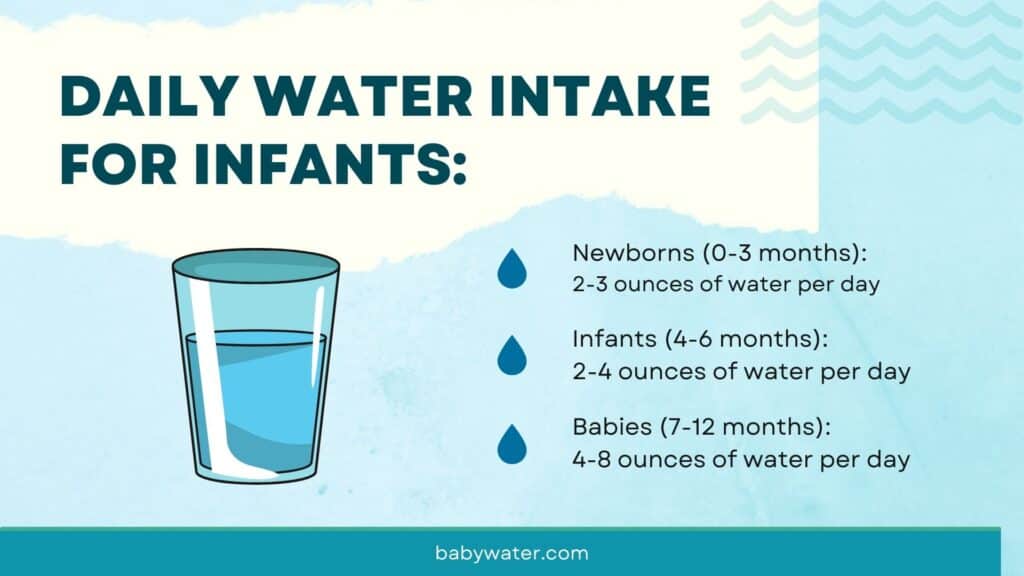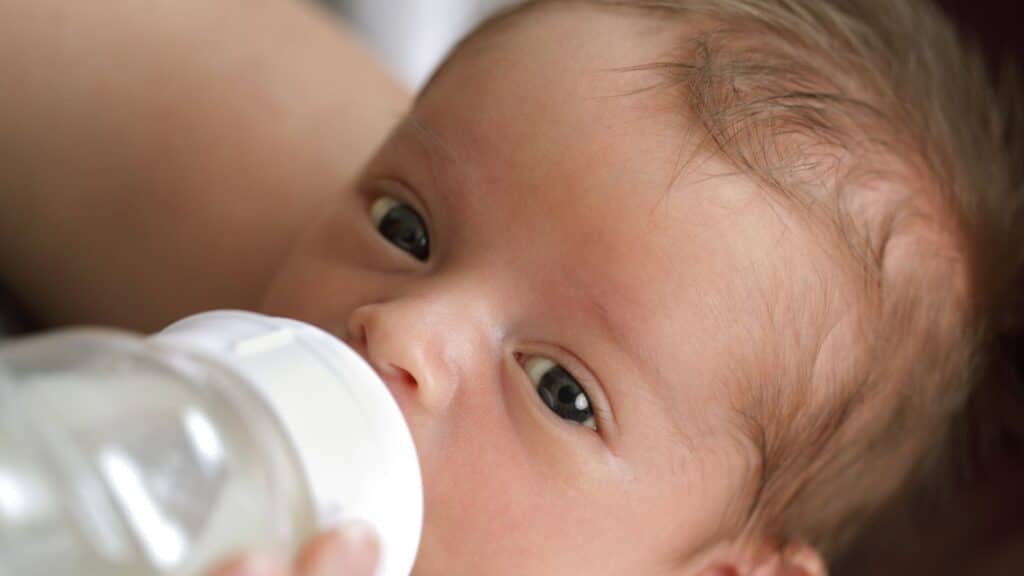As a parent or caregiver, ensuring that your baby is hydrated is essential for their growth and development. However, determining how much water a baby should be drinking can be challenging, especially for first-time parents.
Babies have different hydration needs than adults, and their water intake requirements can vary depending on their age, weight, and other factors.
In this blog post, we will provide you with a comprehensive water intake chart specifically for babies, you’ll clearly understand how to keep your baby adequately hydrated and healthy.
Join us as we delve into keeping your little one hydrated, a comprehensive water intake chart and learn how to ensure that your baby remains well-hydrated.

Water Needs in Infants
Water is essential for life, and it plays a vital role in the healthy growth and development of infants. Babies obtain the water they need through various sources, primarily through breast milk and formula. Here’s the different ways infants get their required water intake and the recommended daily water intake for this age group.
Sources of Water for Infants:
Breast Milk: Breast milk is the ideal source of nutrition for infants in their first six months of life. It contains all the essential nutrients, including water, that a baby needs for proper growth and development. Approximately 87% of breast milk is composed of water, ensuring that the infant stays well-hydrated. Moreover, the water content of breast milk changes throughout the feeding, with the initial milk (foremilk) being more watery and the later milk (hindmilk) being richer in fat and calories.
Formula: For infants who cannot be breastfed, infant formula is a suitable alternative. Like breast milk, formula also contains a significant amount of water. When preparing the formula, it is essential to follow the manufacturer’s instructions for mixing the right proportions of water and formula powder to ensure the baby receives the proper nutrients and hydration.
Additional Water: After six months of age, when infants start consuming solid foods, it is generally safe to introduce small amounts of water in their diet. However, it is crucial not to overdo it, as too much water can lead to water intoxication and disrupt the balance of electrolytes in the baby’s body. Consult with a pediatrician to determine the appropriate amount of water for your baby based on their age, weight, and other factors.
Recommended Daily Water Intake for Infants:
During the first six months of life, breast milk or formula should be the primary source of hydration for infants, and there is no need to offer additional water unless advised by a healthcare professional. As a general guideline:
- Newborns (0-3 months): 2-3 ounces of water per day, primarily from breast milk or formula
- Infants (4-6 months): 2-4 ounces of water per day, in addition to breast milk or formula
- Babies (7-12 months): 4-8 ounces of water per day, in addition to breast milk, formula, and solid foods

It’s important to note that water should not be given to babies under 6 months old unless advised by a doctor, as their kidneys are not yet mature enough to handle it. Also, breast milk or formula should remain the primary source of hydration for babies.
Once the infant starts consuming solid foods around six months, their water needs may increase. However, it is essential to remember that breast milk or formula should still be the primary source of hydration, and water should only be offered in small amounts. Talk to your pediatrician to determine the right amount of water for your baby based on their specific needs.
It is essential to monitor the signs of dehydration in infants, such as fewer wet diapers, dry mouth, and sunken soft spot on the head. Dehydration can lead to an increase in body temperature, which can be dangerous for infants. It is crucial to ensure that infants are getting enough fluid intake throughout the day to stay hydrated. Offering plain water or tap water is generally the best option, as sports drinks, sugary drinks, artificially sweetened drinks, fruit juice, energy drinks, flavored milk, and more fluids can contain excessive amounts of sugar or caffeine, which can be harmful to infants. A good indicator of proper hydration is light yellow or clear urine.
Signs of Dehydration in Infants
Dehydration in infants can be a serious concern, as their small bodies are more vulnerable to the effects of fluid loss. It is crucial for parents and caregivers to be aware of the common signs of dehydration in infants, whether they are being fed with breastmilk or formula, as it can be life-threatening if left untreated. Here is a list of common signs of dehydration in infants:

Dry Mouth and Lips:
The infant’s mouth may appear parched, with dry, cracked lips. A lack of saliva production can also be an indication of dehydration, whether they are being given plain water, other beverages, or flavored milks.
Fewer Wet Diapers:
A significant decrease in the number of wet diapers, or diapers that are less wet than usual, can be a sign of reduced fluid intake or output, whether they are in hot weather or not.
Sunken Soft Spot (Fontanelle):
The soft spot on the top of an infant’s head may appear sunken, indicating dehydration. It is especially important to keep infants hydrated, as younger children or those in poor health are more prone to heat stroke in hot weather.
Lethargy:
Infants may become less active, drowsy, or have difficulty waking up as a result of dehydration. It is important to provide water bottles or fluids regularly to ensure they have enough fluid intake throughout the day.
Irritability:
Dehydrated infants may be fussier than usual or difficult to soothe. Sweetened drinks or juice should be avoided as they can cause tooth decay and other health issues.
Sunken Eyes:
The infant’s eyes may appear hollow or sunken due to the loss of fluid. It is important to consult a pediatrician immediately if any signs of dehydration are present, as they can advise on how much water or fluid the baby needs to drink.

Cold or Mottled Skin:
The infant’s skin may feel cool to the touch or show a mottled, bluish-purple appearance. Endurance athletes or physically active older children need more fluid than younger children or older adults.
Rapid Breathing or Increased Heart Rate:
Dehydration can cause the infant’s body to work harder to maintain proper function, resulting in rapid breathing or an increased heart rate. It is important to monitor fluid intake and ensure they are drinking enough water or fluids to prevent overhydration, which can also have negative effects on the body.
Decreased Skin Elasticity:
When gently pinched, the skin of a dehydrated infant may not return to its normal position as quickly as it should. Dark colored urine can also be a sign that they are not drinking enough water or fluids, and need to drink plenty throughout the day.
Dehydration in infants can pose significant risks to their health and development. Some of the potential consequences include:
Electrolyte Imbalances:
Dehydration can disrupt the balance of essential electrolytes in the infant’s body, potentially leading to complications such as seizures or heart rhythm disturbances. The national health recommends consulting a healthcare professional immediately if any signs of dehydration are present.
Kidney and Urinary Problems:
Prolonged dehydration can lead to kidney damage, urinary tract infections, or kidney stones. It is important to provide infants with enough fluids or water to prevent dehydration.
Impaired Growth and Development:
Chronic dehydration may hinder an infant’s growth and development, as essential nutrients and electrolytes are not adequately supplied to the body. It is important to ensure they are getting enough fluids or water to meet their fluid needs.
Heat-Related Illnesses:
Dehydration can make infants more susceptible to heat exhaustion or heatstroke, especially in hot weather. Infants should be given enough fluid or water to ensure they do not get dehydrated.

Introducing Water to Infants
Water can be introduced to infants after they reach the age of six months, as recommended by the American Academy of Pediatrics (AAP) for proper drinking water. Before that age, an infant’s body is not equipped to handle water and can disrupt the balance of electrolytes and nutrients in their body. It’s also essential to note that breast milk or formula should remain the primary source of nutrition for infants until they are six months old to maintain adequate fluid intake.
Regarding the type of water, the AAP recommends using boiled and cooled tap water or bottled water that is labeled safe for infants, depending on the local water quality. It’s essential to check the mineral content of bottled water and ensure that it’s suitable for infants to drink plain water. Additionally, avoid using well water or unfiltered water, as it can contain harmful contaminants that can harm an infant’s health.
To prepare safe water for infants, start by washing your hands thoroughly and cleaning the utensils, bottle, or cup that you’ll be using. Then, boil the tap water for at least one minute and let it cool to room temperature before giving it to your baby to ensure safe drinking water. Alternatively, use bottled water that’s labeled safe for infants and doesn’t need boiling. Avoid using a microwave to heat the water, as it can result in uneven heating and hot spots that can scald your infant’s mouth.
Tips for Ensuring Hydration in Infants
Ensuring proper hydration in infants is essential for their growth and development. Here are some tips to help you keep your little one hydrated:

Monitor Wet Diapers:
One of the simplest ways to gauge your baby’s hydration is by keeping track of the number of wet diapers they produce daily. For newborns up to 4 weeks old, expect at least six wet diapers per day. Infants between 4 weeks and 6 months should have four to six wet diapers daily. If you notice a decrease in the number of wet diapers or a change in the color or consistency of the urine, consult with your pediatrician.
Offer Water with Meals:
Once your baby starts eating solid foods, typically around six months of age, it’s essential to offer them water with their meals. Begin with small sips to help them get used to the taste and feeling of drinking water. As your baby grows, gradually increase the amount you offer. Remember not to replace breast milk or formula with water, as they still need the nutrients and calories from their regular feeds.
Use a Sippy Cup or Bottle:
Transitioning your baby from a bottle or breast to a sippy cup can help them learn how to drink water independently. Choose a sippy cup with a spill-proof design and handles for easy gripping. Introduce the sippy cup gradually during mealtimes, and always supervise your baby when they drink from it.
Keep an Eye on the Weather and Adjust Accordingly:
During hot weather, your baby may need extra fluids, including plain water and breast milk or formula, to stay properly hydrated with how much fluid. Increase the frequency of breastfeeding or formula feeding, and offer water more often to avoid dehydration. If you’re going to be outside, keep your baby in the shade, and dress them in light, breathable clothing to reduce the risk of overheating. Ice cubes or frozen breast milk can also be used as a refreshing treat for infants during hot weather but should not replace regular feedings.
Pay Attention to Hydration During Illness:
If your baby is unwell, they may lose fluids through vomiting, diarrhea, or fever. It’s essential to ensure they’re receiving enough fluids to prevent dehydration. Offer extra breast milk or formula, and if your baby is over six months old, provide small sips of water frequently. Consult your pediatrician if you’re concerned about your baby’s hydration during illness.

Conclusion
In conclusion, maintaining proper hydration for your little one is essential for their overall health and development. This comprehensive water intake chart serves as a valuable resource for parents and caregivers to ensure that children receive the right amount of water based on their age, weight, and activity level.
By closely monitoring and adjusting their water intake, you’re setting the foundation for lifelong healthy habits. Remember, it’s not just about quenching their thirst, but also about supporting their growth, cognitive function, and overall well-being.
Keep a watchful eye and encourage your child to drink water regularly, making hydration a fun and enjoyable experience for them. With the right guidance and support, your little one will surely thrive on the path to a well-hydrated and healthy life.
Did this article help you? If so, we’d love to hear from you! Do you have a question about this article or other topics related to online marketing? Let us know in the comments.



